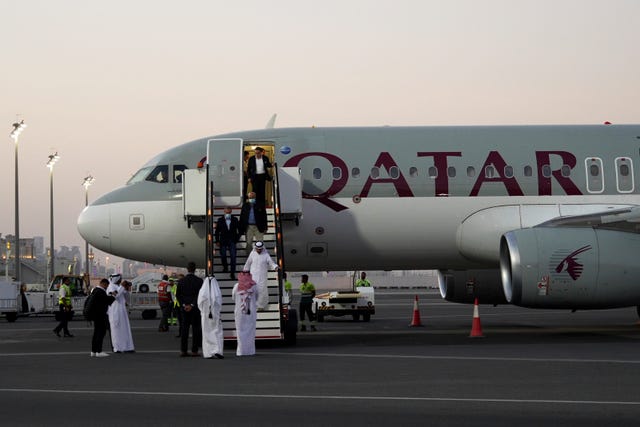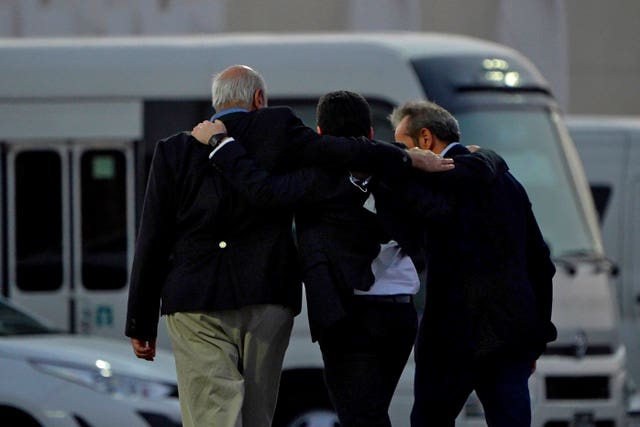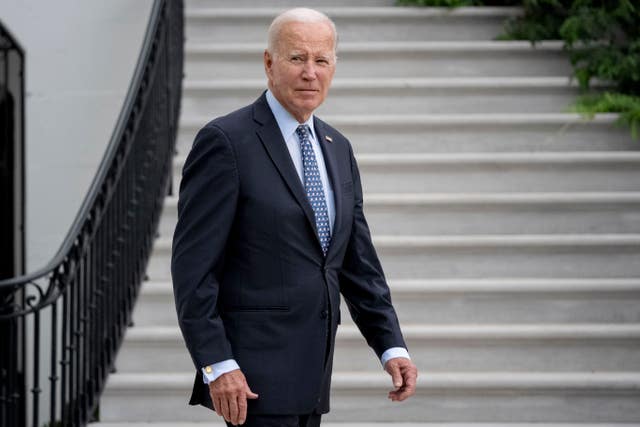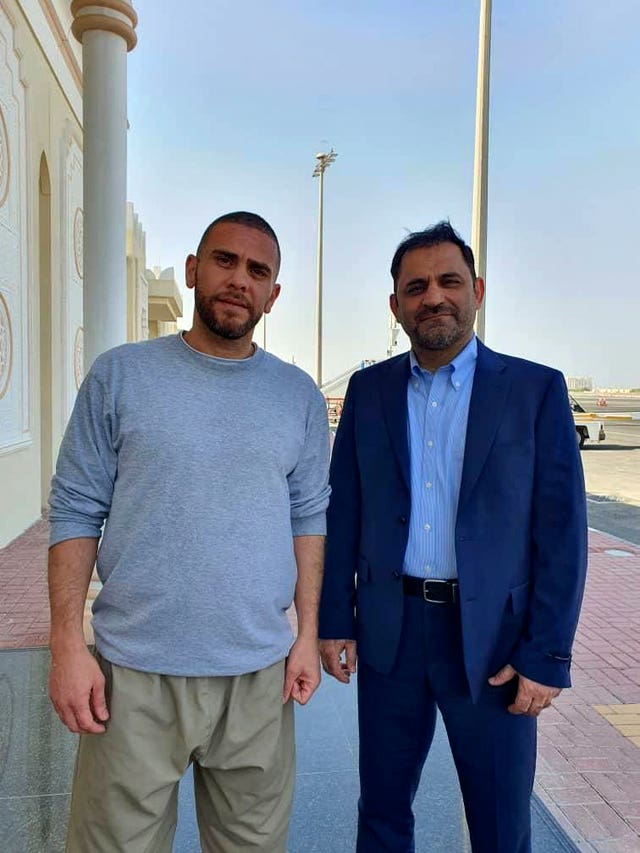Five prisoners sought by the US in a prisoner swap with Iran including British-American-Iranian Morad Tahbaz have landed in Qatar, officials said.
It is part of a deal that saw nearly six billion dollars (£4.85 billion) in Iranian assets unfrozen.
“Today, five innocent Americans who were imprisoned in Iran are finally coming home,” US President Joe Biden said in a statement released as the plane carrying the group from Tehran landed in Doha, Qatar.
After the plane slowed to a stop, three of the prisoners walked down the ramp and were greeted by the US ambassador to Qatar, Timmy Davis. The former prisoners hugged the ambassador and others.
The three — Mr Tahbaz, Siamak Namazi and Emad Sharghi — then wrapped their arms around their shoulders and walked off to a building in the airport.
In a statement issued on his behalf after landing, Mr Namazi said: “I would not be free today, if it wasn’t for all of you who didn’t allow the world to forget me.”

“Thank you for being my voice when I could not speak for myself and for making sure I was heard when I mustered the strength to scream from behind the impenetrable walls of Evin Prison,” Mr Namazi said.
In addition to the five prisoners, two of the imprisoned Americans’ family members, Effie Namazi and Vida Tahbaz, who had been held under travel bans in Iran, also were on the plane. The women, too, clasped arms and kissed on the tarmac in Qatar.
US officials have declined to identify the two other released prisoners.
In a statement, Mr Sharghi’s sister, Neda, said she “can’t wait to hug my brother and never let him go”.
“This is my brother, not an abstract policy,” she added. “We are talking about human lives. There is nothing partisan about saving the lives of innocent Americans and today should be a moment of American unity as we welcome them home.”
The cash represents money South Korea owed Iran — but had not yet paid — for oil purchased before the US imposed sanctions on such transactions in 2019.
Despite the deal, tensions are almost certain to remain high between the US and Iran, which are locked in various disputes, including over Tehran’s nuclear programme. Iran says the programme is peaceful, but it now enriches uranium closer than ever to weapons-grade levels.

The planned exchange has unfolded amid a major American military build-up in the Persian Gulf, with the possibility of US troops boarding and guarding commercial ships in the Strait of Hormuz, through which 20% of all oil shipments pass.
Earlier, Iranian Foreign Ministry spokesman Nasser Kanaani said that the exchange would take place Monday after nearly six billion dollars in once-frozen Iranian assets reached Qatar.
“Fortunately Iran’s frozen assets in South Korea were released and God willing today the assets will start to be fully controlled by the government and the nation,” Mr Kanaani said.
“On the subject of the prisoner swap, it will happen today and five prisoners, citizens of the Islamic Republic, will be released from the prisons in the US,” he added. “Five imprisoned citizens who were in Iran will be given to the US side.”
He said two of the Iranian prisoners will stay in the US. Meanwhile, Nour News, a website believed to be close to Iran’s security apparatus, said two of the Iranian prisoners had arrived in Doha for the swap.
Mohammad Reza Farzin, Iran’s Central Bank chief, later came on state television to acknowledge the receipt of more than 5.5 billion euros in accounts in Qatar. Months ago, Iran had anticipated getting as much as seven billion.

The exchange comes ahead of the convening of world leaders at the UN General Assembly this week in New York, where Iran’s hard-line President Ebrahim Raisi will speak.
The deal has already opened Mr Biden to fresh criticism from Republicans and others who say that the administration is helping boost the Iranian economy at a time when Iran poses a growing threat to American troops and Middle East allies. That could have implications in his re-election campaign.
Former US president Donald Trump, currently the lead Republican challenger in the polls against Mr Biden’s 2024 re-election bid, called it an “absolutely ridiculous” deal on the Truth Social social media site. Senate Minority Leader Mitch McConnell accused Mr Biden of “rewarding and incentivising Tehran’s bad behaviour”.
Mr Biden held what the White House described as an emotional phone call with the families of the freed Americans after their release.
In his statement, Mr Biden urged Americans not to travel to Iran, and he demanded more information on what happened to Bob Levinson, an American who went missing several years ago. Mr Biden also announced sanctions on former Iranian President Mahmoud Ahmadinejad and the Iranian Ministry of Intelligence.
The prisoners freed on Monday were Mr Namazi, who was detained in 2015 and was later sentenced to 10 years in prison on spying charges; Mr Sharghi, a venture capitalist sentenced to 10 years; and Mr Tahbaz, a British-American conservationist of Iranian descent who was arrested in 2018 and also received a 10-year sentence.
All their charges have been widely criticised by their families, activists and the US government.
US officials have declined to identify the fourth and fifth prisoners.
US Secretary of State Antony Blinken thanked the Qataris, Swiss, South Koreans and Omanis for helping in the exchange, and pledged in a statement to keep pressing for “accountability for Iran and other regimes for the cruel practice of wrongful detention”.

The five prisoners Iran has said it seeks are mostly held over allegedly trying to export banned material to Iran, such as dual use electronics that can be used by a military.
The two that Nour News said were in Doha were Mehrdad Ansari, an Iranian sentenced to 63 months in prison in 2021 for obtaining equipment that could be used in missiles, electronic warfare, nuclear weapons and other military gear, and Reza Sarhangpour Kafrani, an Iranian charged in 2021 over allegedly unlawfully exporting laboratory equipment to Iran.
The cash represents money South Korea owed Iran — but had not yet paid — for oil purchased before the US imposed sanctions on such transactions in 2019.
The US maintains that, once in Qatar, the money will be held in restricted accounts and will only be able to be used for humanitarian goods, such as medicine and food. Those transactions are currently allowed under American sanctions targeting the Islamic Republic over its advancing nuclear programme.
Iranian government officials have largely concurred with that explanation, though some hard-liners have insisted, without providing evidence, that there would be no restrictions on how Tehran spends the money.
Iran and the US have a history of prisoner swaps dating back to the 1979 US Embassy takeover and hostage crisis following the Islamic Revolution. Their most recent major exchange happened in 2016, when Iran came to a deal with world powers to restrict its nuclear program in return for an easing of sanctions.
The West accuses Iran of using foreign prisoners — including those with dual nationality — as bargaining chips, an allegation Tehran rejects.
Negotiations over a major prisoner swap faltered after then-President Donald Trump unilaterally withdrew America from the nuclear deal in 2018. From the following year on, a series of attacks and ship seizures attributed to Iran have raised tensions.
Meanwhile, Iran’s nuclear programme now enriches closer than ever to weapons-grade levels. While the head of the United Nations’ nuclear watchdog has warned that Iran now has enough enriched uranium to produce “several” bombs, months more would likely be needed to build a weapon and potentially miniaturize it to put it on a missile — if Iran decided to pursue one.
Iran maintains its nuclear programme is peaceful, and the US intelligence community has kept its assessment that Iran is not pursuing an atomic bomb.
Iran has taken steps in recent months to settle some issues with the International Atomic Energy Agency. But the advances in its programme have led to fears of a wider regional conflagration as Israel, itself a nuclear power, has said it would not allow Tehran to develop the bomb.
Israel bombed both Iraq and Syria to stop their nuclear programmes, giving the threat more weight. It also is suspected in carrying out a series of killings targeting Iran’s nuclear scientists.
Iran also supplies Russia with the bomb-carrying drones Moscow uses to target sites in Ukraine in its war on Kyiv, which remains another major dispute between Tehran and Washington.





Comments: Our rules
We want our comments to be a lively and valuable part of our community - a place where readers can debate and engage with the most important local issues. The ability to comment on our stories is a privilege, not a right, however, and that privilege may be withdrawn if it is abused or misused.
Please report any comments that break our rules.
Read the rules hereLast Updated:
Report this comment Cancel